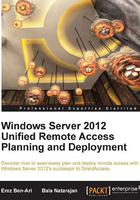
Summary
This chapter introduces quite a bit of jargon and may be a little hard to swallow at first. It should not, however, prevent you from going forward and start dealing with the next steps of deploying URA. In the next chapter, we will discuss planning your deployment, and go through various considerations and scenarios. If you don't feel 100 percent comfortable with all the terms and technologies introduced here, don't worry—you can always come back to it, and after having played with the actual interface of URA a bit, things will make a lot more sense!
- Answer to question 1:
2001:0000:4137:9e76:3494:00b4:e7ee:3d10 - Answer to question 2:
The obfuscated IP
e7ee:3d10 is 1110011111101110:0011110100010000in binary. Inverted, it is1100000010001:1100001011101111or1811:C2EF in hex. Now, convert each two hex digits to decimal, to arrive at the IP24.17.194.239.